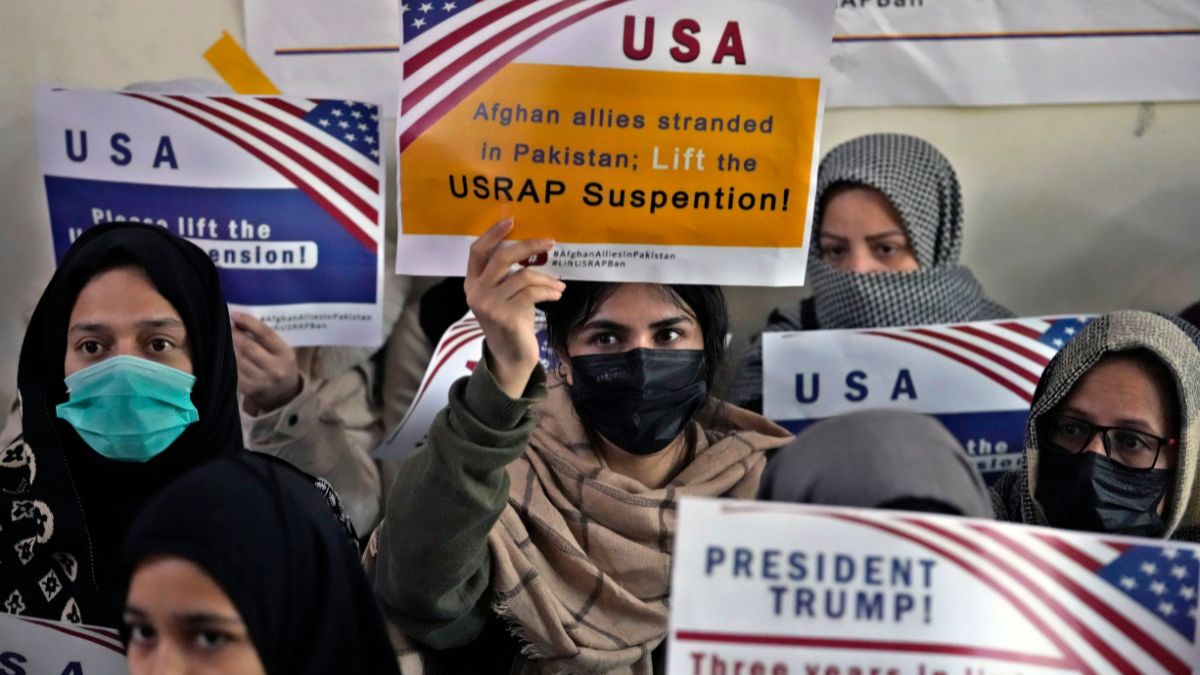Pakistan has planned to deport Afghan refugees and asylum-seekers, raising alarm bells among United Nations agencies focused on refugees and migration. The Shehbaz Sharif-led government has decided to relocate Afghan nationals out of Islamabad and Rawalpindi and eventually repatriate them to their home country.
When the Taliban took over Afghanistan in 2021, hundreds of thousands of refugees fled to neighbouring Pakistan. Now, Pakistan is threatening to send them back. But why?
We will explain.
Afghan refugees in Pakistan
Over 3 million (30 lakh) Afghan refugees are believed to be living in Pakistan, according to the UN Refugee Agency (UNHCR). Of these, more than 800,000 are undocumented people.
Some came to Pakistan after fleeing the Soviet invasion of Afghanistan in the 1980s, others in the aftermath of the September 11 attacks and the following two decades of conflict, noted CNN.
A new wave of Afghans escaped from their country after the Taliban came to power in 2021, including those who had worked with United States or NATO forces and were fearful of potential reprisals from the radical Islamist group.
These Afghan nationals were promised resettlement in the US through a programme for people at risk due to their work with the American government, media, aid agencies and rights groups, as per Associated Press (AP).
In 2023, Pakistan launched a fresh crackdown on undocumented Afghan refugees to push the Taliban to make more efforts to curb militant attacks from Afghanistan.
The International Organization for Migration (IOM) estimates that 805,991 Afghans have since left Pakistan.
Pakistan threatens to deport Afghans
Pakistan has drawn up a three-stage plan to deport Afghan citizens residing in Pakistan.
In phase one, people having the Afghan Citizens Card (ACC) will be “immediately” moved out of the twin cities of Islamabad and Rawalpindi. They will then be sent back to Afghanistan, along with illegal and undocumented refugees, reported Pakistan’s Dawn newspaper.
As per a Voice of America (VOA) report, the ACC population is estimated at more than 800,000. IOM says that the ACC gives temporary legal status to Afghans living in Pakistan.
In the second phase, Afghan nationals who have a Proof of Registration Card (PoR) will be repatriated. They will be relocated from Islamabad and Rawalpindi, but will not be deported immediately, as per Dawn sources.
Pakistan has allowed over 1.4 million (14 lakh) legal Afghan refugees to remain in the country until June 30 this year.
In the third phase, the Sharif government has ordered the removal of around 40,000 Afghans from the twin cities by March 31 for deportation if their relocation and resettlement cases to third countries are not swiftly processed by host governments. If they are not removed by that date, they will be “repatriated to Afghanistan,” CNN reported citing the Pakistan government’s three-stage repatriation plan.
Last month, American President Donald Trump paused the US Refugee Admission Program, effectively dashing the hopes of refugees globally who were awaiting their US resettlement.
Two security officials told AP that Pakistan Prime Minister Shehbaz Sharif decided last week that refugees would be deported back to Afghanistan unless their cases were processed quickly.
In a statement, Pakistan’s Interior Ministry confirmed to CNN that “all illegal foreigners including Afghans are to be deported back to their countries of origin under the Illegal Foreigners Repatriation Plan (IFRP).”
It asked countries sponsoring Afghan nationals for resettlement to complete the process quickly, or “the sponsored Afghans will be deported.”
Fear of deportation looms
Pakistan has intensified its crackdown on Afghan refugees living in Islamabad and Rawalpindi. On Thursday (February 6), Afghan nationals shared videos of the Rawalpindi police carrying out raids on houses and detaining several people, as per Amu TV.
Many Afghans who worked for the US and are now living in Pakistan are fearful of being killed if forced to return to their homeland.
Shakoofa Khalili, an Afghan national living with her husband and daughter in Islamabad and awaiting US resettlement told CNN about the risks she and others have taken “to support the United States’ mission as interpreters, contractors, human rights defenders and allies.”
She said “the Taliban views us as enemies, and we face the grim reality of arrest, torture, or death if we are forced back.”
“This suspension (of the visa programme) denies us the shelter and protection we were promised, leaving us vulnerable to unimaginable consequences and at the mercy of the Taliban.”
According to Shawn VanDiver, the founder of #AfghanEvac, a leading coalition of resettlement and veteran groups, about 10,000 to 15,000 Afghans in Pakistan are waiting for visas or resettlement in the US.
In a post on X, VanDiver said Trump halting the US Refugee Admissions Program (USRAP) disproportionately affects Afghan women in Pakistan, leaving them without work, legal protections and hope.
“Since the fall of Kabul, Afghan women have been systematically erased from public life —banned from education, work, and even basic freedoms. For many, USRAP was the only viable path to safety. With the pause, that door has slammed shut,” he said.
The UNHCR and the IOM warned Wednesday that the Afghans forced to return face retribution from the Taliban, particularly ethnic and religious minorities, women and girls, journalists, human rights activists, and members of artistic professions.
Speaking to AP, Ahmad Shah, a member of the Afghan US Refugee Admission Program advocacy group, urged Pakistan to seek answers from the US and other countries “if and when they will begin completing the process” for their relocation. He emphasised that Afghan refugees are already under emotional stress and trauma.
With inputs from agencies


)

)
)
)
)
)
)
)
)



